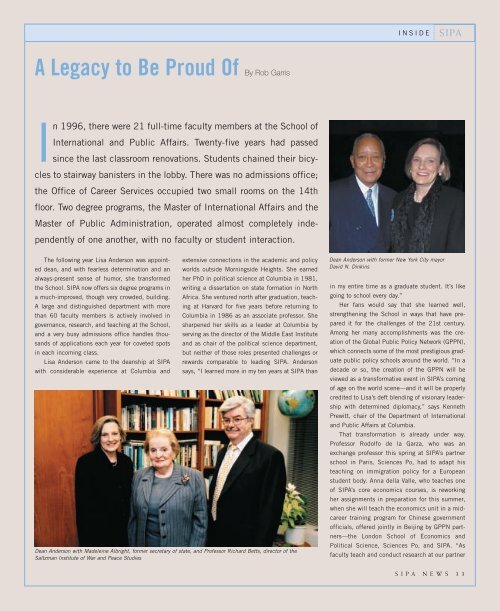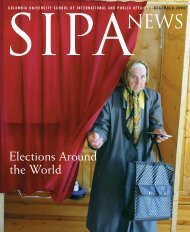The Energy Issue - School of International and Public Affairs ...
The Energy Issue - School of International and Public Affairs ...
The Energy Issue - School of International and Public Affairs ...
You also want an ePaper? Increase the reach of your titles
YUMPU automatically turns print PDFs into web optimized ePapers that Google loves.
INSIDE<br />
SIPA<br />
A Legacy to Be Proud Of By Rob Garris<br />
In 1996, there were 21 full-time faculty members at the <strong>School</strong> <strong>of</strong><br />
<strong>International</strong> <strong>and</strong> <strong>Public</strong> <strong>Affairs</strong>. Twenty-five years had passed<br />
since the last classroom renovations. Students chained their bicycles<br />
to stairway banisters in the lobby. <strong>The</strong>re was no admissions <strong>of</strong>fice;<br />
the Office <strong>of</strong> Career Services occupied two small rooms on the 14th<br />
floor. Two degree programs, the Master <strong>of</strong> <strong>International</strong> <strong>Affairs</strong> <strong>and</strong> the<br />
Master <strong>of</strong> <strong>Public</strong> Administration, operated almost completely independently<br />
<strong>of</strong> one another, with no faculty or student interaction.<br />
<strong>The</strong> following year Lisa Anderson was appointed<br />
dean, <strong>and</strong> with fearless determination <strong>and</strong> an<br />
always-present sense <strong>of</strong> humor, she transformed<br />
the <strong>School</strong>. SIPA now <strong>of</strong>fers six degree programs in<br />
a much-improved, though very crowded, building.<br />
A large <strong>and</strong> distinguished department with more<br />
than 60 faculty members is actively involved in<br />
governance, research, <strong>and</strong> teaching at the <strong>School</strong>,<br />
<strong>and</strong> a very busy admissions <strong>of</strong>fice h<strong>and</strong>les thous<strong>and</strong>s<br />
<strong>of</strong> applications each year for coveted spots<br />
in each incoming class.<br />
Lisa Anderson came to the deanship at SIPA<br />
with considerable experience at Columbia <strong>and</strong><br />
extensive connections in the academic <strong>and</strong> policy<br />
worlds outside Morningside Heights. She earned<br />
her PhD in political science at Columbia in 1981,<br />
writing a dissertation on state formation in North<br />
Africa. She ventured north after graduation, teaching<br />
at Harvard for five years before returning to<br />
Columbia in 1986 as an associate pr<strong>of</strong>essor. She<br />
sharpened her skills as a leader at Columbia by<br />
serving as the director <strong>of</strong> the Middle East Institute<br />
<strong>and</strong> as chair <strong>of</strong> the political science department,<br />
but neither <strong>of</strong> those roles presented challenges or<br />
rewards comparable to leading SIPA. Anderson<br />
says, “I learned more in my ten years at SIPA than<br />
Dean Anderson with Madeleine Albright, former secretary <strong>of</strong> state, <strong>and</strong> Pr<strong>of</strong>essor Richard Betts, director <strong>of</strong> the<br />
Saltzman Institute <strong>of</strong> War <strong>and</strong> Peace Studies<br />
Dean Anderson with former New York City mayor<br />
David N. Dinkins<br />
in my entire time as a graduate student. It’s like<br />
going to school every day.”<br />
Her fans would say that she learned well,<br />
strengthening the <strong>School</strong> in ways that have prepared<br />
it for the challenges <strong>of</strong> the 21st century.<br />
Among her many accomplishments was the creation<br />
<strong>of</strong> the Global <strong>Public</strong> Policy Network (GPPN),<br />
which connects some <strong>of</strong> the most prestigious graduate<br />
public policy schools around the world. “In a<br />
decade or so, the creation <strong>of</strong> the GPPN will be<br />
viewed as a transformative event in SIPA’s coming<br />
<strong>of</strong> age on the world scene—<strong>and</strong> it will be properly<br />
credited to Lisa’s deft blending <strong>of</strong> visionary leadership<br />
with determined diplomacy,” says Kenneth<br />
Prewitt, chair <strong>of</strong> the Department <strong>of</strong> <strong>International</strong><br />
<strong>and</strong> <strong>Public</strong> <strong>Affairs</strong> at Columbia.<br />
That transformation is already under way.<br />
Pr<strong>of</strong>essor Rodolfo de la Garza, who was an<br />
exchange pr<strong>of</strong>essor this spring at SIPA’s partner<br />
school in Paris, Sciences Po, had to adapt his<br />
teaching on immigration policy for a European<br />
student body. Anna della Valle, who teaches one<br />
<strong>of</strong> SIPA’s core economics courses, is reworking<br />
her assignments in preparation for this summer,<br />
when she will teach the economics unit in a midcareer<br />
training program for Chinese government<br />
<strong>of</strong>ficials, <strong>of</strong>fered jointly in Beijing by GPPN partners—the<br />
London <strong>School</strong> <strong>of</strong> Economics <strong>and</strong><br />
Political Science, Sciences Po, <strong>and</strong> SIPA. “As<br />
faculty teach <strong>and</strong> conduct research at our partner<br />
SIPA NEWS 33

















